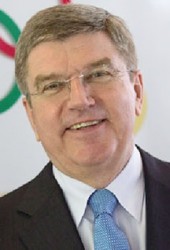MONACO, (Reuters) – Radical changes to how cities will bid to host Olympic Games, and rules allowing more sports to feature, were among 40 innovations ushered in yesterday as International Olympic Committee members took bold steps to revamp their movement.
On a day which will define the modern IOC for decades, sweeping alterations to the bidding process were unanimously approved, making it easier and cheaper for host city hopefuls.
The changes to the bidding process include allowing hosts to stage some Olympic events in other cities, and even countries.
IOC members also scrapped a cap on 28 sports for a Summer Olympics, agreeing instead to limit the Games to 10,500 athletes and 310 events.
“No. Even in my wildest dreams I would not have expected this,” IOC president Thomas Bach told reporters in Monaco after pushing through all 40 of his ‘Agenda 2020’ reforms in one day without a single vote of opposition from the 100-plus IOC membership.
“It showed the great determination of the members for these reforms to make it happen, to make this progress. That it would go like this was a very positive surprise.
“Some of the recommendations were not easy to swallow. This made this day so special and encouraging when it came to the vote regardless of their own interest, their own position, they were determined to make this Agenda 2020 a success.”
MAJOR INNOVATIONS

Other major innovations included the creation of an Olympic digital TV channel, and a new policy to guard against discrimination including based on sexual orientation, a term that had not featured in their Principle 6 anti-discrimination clause.
Bach was delighted at passing his first test with flying colours, as all his moves to revamp the Olympic movement received unanimous support.
But the 40 amendments do not signify good times for all. Some events within sports will need to be cut to make room for newcomers, and that realisation sparked instant jockeying among sports federations eager to protect their turf.
Canadian IOC member Dick Pound already knows which events he reckons the Games could do without to pave the way for new ones.
“Synchronised swimming… and maybe triple jump,” he told Reuters. “Everybody has to share the load for the good of the Olympics.”
Double Olympic gold medallist Sebastian Coe, who recently launched his campaign to become president of world athletics’ governing body, the IAAF, was quick to respond.
“I’ll let Dick make observations about his own sport and I will make them about mine, and triple jump is a sacrosanct sport in track and field,” Coe told reporters in Monaco.
INTENSE LOBBYING
Members can now brace themselves for a period of intense lobbying ahead of the 2020 Tokyo Games, with baseball and softball in particular seeking a spot on the programme.
The World Baseball Softball Confederation (WBSC), however, was crackling with excitement.
“It’s like when the manager calls you off the bench to pick up the bat and warm up, and the bases are loaded,” president Riccardo Fraccari said. “All you want to do is swing for the fences.”
Eager to avoid a repeat of the 2022 Winter Games campaign in which four of six candidates dropped out in mid-race over financial concerns, denting the Games’ reputation as a lucrative project, the IOC voted to adopt recommendations to make the bidding process easier and cheaper.
The changes also include an invitation phase where potential candidates can first discuss plans with the IOC before deciding whether to launch a campaign to stage the Games.
This will avoid a situation like the 2022 bidding debacle.
Cities have spent close to $100 million on campaigns aimed at wooing IOC members to give them the honour of staging the Summer Olympics, about half that for winter bids.
“The compactness of the Games has to be weighed up against the benefit of using existing venues,” Australian John Coates told his fellow IOC members at Monaco’s Grimaldi Forum.
“These changes do contemplate different cities and countries hosting the Games, and this is for reasons of sustainability,” added Coates, who led a working group looking at the bid process.









